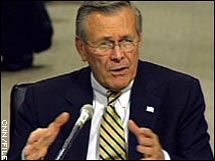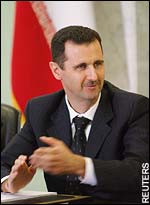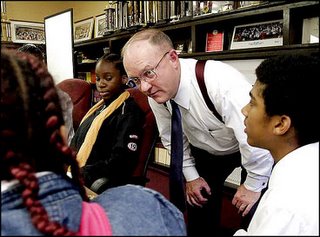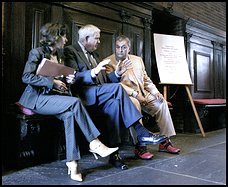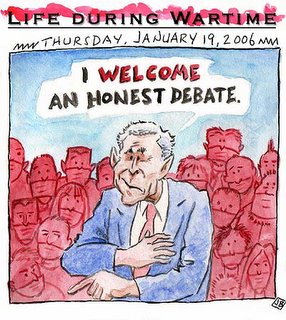The following is about a year and a half old. If you haven't read it before, it's made it's rounds, then you really should read it. I'm not sure if it can be stated any more succintly.
"Dear America"
Received this from Seamus via Col Myers. JDL is a retire two star who forwarded this letter from Lt. Brown in Iraq. It's another must read.
This letter was written by Lt. Kevin Brown, USMC, a Marine Cobra pilot and 2001 graduate of the United States Naval Academy. He expresses a basic thought that is becoming a common thread in emails sent by those serving in Iraq.
Those who are serving there are smart enough to detect a basic fallacy in the words of many. Simply stated, one cannot say that one is supporting the troops in Iraq while saying that one does not support what they are doing. In the words of Lieutenant Brown, "you cannot both support the troops and protest their mission".
What they see coming is another version of Vietnam...eventually the charade will be played to its natural conclusion and neither the troops nor what they are doing will be supported. With the rug pulled out, they will then become a latter day version of the Vietnam Veteran. Those who had the Vietnam experience know exactly what I mean. It is our duty to do our best to make certain that it doesn't happen to our successors. Which, of course, is why this email, one that was provided by a major retired Marine circuit, is forwarded to so many.
What they are also seeing is that a large segment of the public has forgotten who attacked whom on 9/11 and who suffered more casualties that day than were suffered on 7 December 1941.
JDL

Dad, you asked me what I would say to America from Iraq on 9/11 if I had a podium and a microphone. I have thought about it, and here is my response.
Your Son,
Kevin
September 11, 2004
Dear America,
"People sleep peaceably in their beds at night only because rough men stand ready to do violence on their behalf." -George Orwell
The Marine Corps is tired. I guess I should not say that, as I have no authority or responsibility to speak for the Marine Corps as a whole, and my opinions are mine alone. I will rephrase: this Marine is tired. I write this piece from the sands of Iraq, west of Baghdad, at three a.m., but I am not tired of the sand. I am neither tired of long days, nor of flying and fighting. I am not tired of the food, though it does not taste quite right. I am not tired of the heat; I am not tried of the mortars that occasionally fall on my base. I am not tired of Marines dying, though all Marines, past and present, mourn the loss of every brother and sister that is killed; death is a part of combat and every warrior knows that going into battle. One dead Marine is too many, but we give more than we take, and unlike our enemies, we fight with honor. I am not tired of the missions or the people; I have only been here a month, after all. I am, however, tired of the hypocrisy and short-sightedness that seems to have gripped so many of my countrymen and the media. I am tired of political rhetoric that misses the point, and mostly I am tired of people "not getting it."
Three years ago I was sitting in a classroom at Quantico, Virginia, while attending the Marine Corps Basic Officer Course, learning about the finer points of land navigation. Our Commanding Officer interrupted the class to inform us that some planes had crashed in New York and Washington D.C., and that he would return when he knew more. Tears welled in the eyes of the Lieutenant on my right while class continued, albeit with an audience that was not very focused; his sister lived in New York and worked at the World Trade Center. We broke for lunch, though instead of going to the chow hall proceeded to a small pizza and sub joint which had a television. Slices of pizza sat cold in front of us as we watched the same vivid images that you watched on September 11, 2001. I look back on that moment now and realize even then I grasped, at some level, that the events of that day would alter both my military career and my country forever. Though I did not know that three years later, to the day, I would be flying combat missions in Iraq as an AH-1W Super Cobra pilot, I did understand that a war had just begun, on television for the world to see, and that my classmates and I would fight that war. After lunch we were told to go to our rooms, clean our weapons and pack our gear for possible deployment to the Pentagon to augment perimeter security. The parting words of the order were to make sure we packed gloves, in case we had to handle bodies.
The first Marine killed in Operation Iraqi Freedom was in my company at The Basic School, and was sitting in that land navigation class on September 11. He fought bravely, led from the front, and was killed seizing an oil refinery on the opening day of the war. His heroism made my emergency procedure memorization for the T-34 primary flight school trainer seem quite insignificant. This feeling of frustration was shared by all of the student pilots, but we continued to press on. As one instructor pointed out to us, "You will fight this war, not me. Make sure that you are prepared when you get there." He was right; my classmates from Pensacola are here beside me, flying every day in support of the Marines on the ground. That instructor has since retired, but I believe he has retired knowing that he made a contribution to the greatest country in the history of the world, the United States of America.
Many of you will read that statement and balk at its apparently presumptuous and arrogant nature, and perhaps be tempted to stop reading right here. I would ask that you keep going, for I did not say that Americans are better than anyone else, for I do not believe that to be the case. I did not say that our country, its leaders, military or intelligence services are perfect or have never made mistakes, because throughout history they have, and will continue to do so, despite their best efforts. The Nation is more than the sum of its citizens and leaders, more than its history, present, or future; a nation has contemporary values which change as its leaders change, but it also has timeless character, ideals forged with the blood and courage of patriots. To quote the Pledge of Allegiance, our nation was founded "under God, indivisible, with liberty and justice for all." As Americans, we have more freedom than we can handle sometimes.

If you are an atheist you might have a problem with that whole "under God" part; if you are against liberating the people of Iraq, Afghanistan, Asia, all of Europe (twice), and the former Soviet bloc, then perhaps the "liberty and justice for all" section might leave you fuming. Our Nation, throughout its history, has watered the seeds of democracy on many continents, with blood, even when the country was in disagreement about those decisions. Disagreement is a wonderful thing. To disagree with your neighbors and your government is at the very heart of freedom. Citizens have disagreed about every important and controversial decision made by their leaders throughout history. Truman had the courage to drop two nuclear weapons in order to end the largest war in history, and then, by his actions, prevented the Soviets from extinguishing the light of democracy in Eastern Europe, Berlin. Lincoln preserved our country through civil war; Reagan knew in his heart that freedom is a more powerful weapon than oppression. Leaders are paid to make difficult, sometimes controversial decisions. History will judge the success of their actions and the purity of their intent in a way that is impossible at the present moment. In your disagreement and debate about the current conflict, however, be very careful that you do not jeopardize your nation or those who serve. The best time to use your freedom of speech to debate difficult decisions is before they are made, not when the lives of your countrymen are on the line.
Cherish your civil rights; I know that after having been in Iraq for only one month I have a new appreciation for mine. You have the right to say that you "support the troops" but oppose the war in Iraq and Afghanistan. You have the right to vote for Senator John Kerry because you believe that he has an exit strategy for Iraq, or because you just cannot stand President Bush. You have the right to vote for President George W. Bush if you believe that he has done a good job over the last four years. You might even decide that you do not want to vote at all and would rather avoid the issues as much as possible. That is certainly your option, and doing nothing is the only option for many people in this world.
It is not my place, nor am I allowed by the Uniformed Code of Military Justice, to tell you how to vote. But I can explain to you the truth about what is going on around you. We know, and have known from the beginning, that the ultimate success or failure of the war in Iraq and Afghanistan, as well as the future of those countries, rests solely on the shoulders of the Iraqi and Afghani people. If someone complains that we should not have gone to war with Saddam Hussein, that our intelligence was bad, that President Bush's motives were impure, then take the appropriate action. Exercise your right to vote for Senator Kerry, but please stop complaining about something that happened over a year ago. The decision to deploy our military in Iraq and Afghanistan is in the past, and while I believe that it is important to the democratic process for our nation to analyze the decisions of our leadership in order to avoid repeating mistakes, it is far more important to focus on the future. The question of which candidate will "get us out of Iraq sooner" should not be a consideration in your mind. YOU SHOULD NOT WANT US OUT OF IRAQ OR AFGHANISTAN SOONER. There is only one coherent exit strategy that will make our time here worthwhile and validate the sacrifice of so many of our countrymen. There is only one strategy that has a chance of promoting peace and stabilizing the Middle East. It is the exit strategy of both candidates, though voiced with varying volumes and differing degrees of clarity. I will speak of Iraq because that is where I am, though I feel the underlying principle applies to both Iraq and Afghanistan.
The American military must continue to help train and support the Iraqi Police, National Guard, and Armed Forces. We must continue to give them both responsibility and the authority with which to carry out those responsibilities, so that they eventually can kill or capture the former regime elements and foreign terrorists that are trying to create a radical, oppressive state. We must continue to repair the infrastructure that we damaged during the conflict, and improve the infrastructure that was insufficient when Saddam was in power. We should welcome and encourage partners in the coalition but recognize that many will choose the path of least resistance and opt out; many of our traditional allies have been doing this for years and it should not surprise us. We must respect the citizens of Iraq and help them to understand the meaning of basic human rights, for those are something the average Iraqi has never experienced. We must be respectful of our cultural and religious differences. We must help the Iraqis develop national pride, and most importantly, we must leave this country better than we found it, at the right time, with a chance of success so that its people will have an opportunity to forge their own destiny. We must do all of these things as quickly and efficiently as possible so that we are not seen as occupiers, but rather liberators and helpers. We must communicate this to the world as clearly and frequently as possible, both with words and actions.

If we leave before these things are done, then Iraq will fall into anarchy and possibly plunge the Middle East into another war. The ability of the United States to conduct foreign policy will be severely, and perhaps permanently, degraded. Terrorism will increase, both in America and around the world, as America will have demonstrated that it is not interested in building and helping, only destroying. If we run or exit early, we prove to our enemies that terror is more powerful and potent than freedom. Many nations, like Spain, have already affirmed this in the minds of the terrorists. Our failure, and its consequences, will be squarely on our shoulders as a nation. It will be our fault. If we stay the course and Iraq or Afghanistan falls into civil war on its own, then our hands are clean. As a citizen of the United States and a U.S. Marine, I will be able to sleep at night with nothing on my conscience, for I know that I, and my country, have done as much as we could for these people. If we leave early, I will not be able to live with myself, and neither should you. The blood will be on our hands, the failure on our watch.
The bottom line is this: Republican or Democrat, approve or disapprove of the decision to go to war, you need to support our efforts here. You cannot both support the troops and protest their mission. Every time the parent of a fallen Marine gets on CNN with a photo, accusing President Bush of murdering his son, the enemy wins a strategic victory. I cannot begin to comprehend the grief he feels at the death of his son, but he dishonors the memory of my brave brother who paid the ultimate price. That Marine volunteered to serve, just like the rest of us. No one here was drafted. I am proud of my service and that of my peers. I am ashamed of that parent's actions, and I pray to God that if I am killed my parents will stand with pride before the cameras and reaffirm their belief that my life and sacrifice mattered; they loved me dearly and they firmly support the military and its mission in Iraq and Afghanistan. With that statement, they communicate very clearly to our enemies around the world that America is united, that we cannot be intimidated by kidnappings, decapitations and torture, and that we care enough about the Afghani and Iraqi people to give them a chance at democracy and basic human rights. Do not support those that seek failure for us, or seek to trivialize the sacrifices made here. Do not make the deaths of your countrymen be in vain. Communicate to your media and elected officials that you are behind us and our mission. Send letters and encouragement to those who are deployed. When you meet a person that serves you, whether in the armed forces, police, or fire department, show them respect. Thank the spouses around you every day, raising children alone, whose loved ones are deployed. Remember not only those that have paid the ultimate price, but the veterans that bear the physical and emotional scars of defending your freedom. At the very least, follow your mother's advice. "If you can't say something nice, don't say anything at all." Do not give the enemy a foothold in our Nation's public opinion. He rejoices at Fahrenheit 9/11 and applauds every time an American slams our efforts. The military can succeed here so long as American citizens support us wholeheartedly.
Sleep well on this third anniversary of 9/11, America. Rough men are standing ready to do violence on your behalf. Many of your sons and daughters volunteered to stand watch for you. Not just rough men- the infantry, the Marine grunts, the Special Operations Forces- but lots of eighteen and nineteen year old kids, teenagers, who are far away from home, serving as drivers, supply clerks, analysts, and mechanics. They all have stories, families, and dreams. They miss you, love you, and are putting their lives on the line for you. Do not make their time here, their sacrifice, a waste. Support them, and their mission.
This gallery is empty.
MY ADDITIONAL COMMENTS:
Please note that the pictures are from the same web site linked above. They are not related to the email above but I'm expressing some editorial control and placing them here. I think they exude the point. Finally, I leave you with this:
"A man who is good enough to shed his blood for his country is good enough to be given a square deal afterwards. More than that no man is entitled, and less than that no man shall have."
President Theodore Roosevelt, Speech to veterans, Springfield, IL, July 4, 1903
